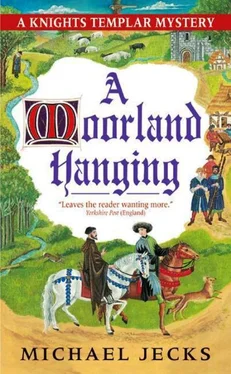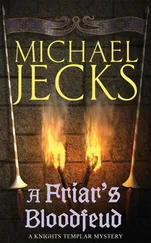That brought Baldwin to thinking about the other men who had been abroad on the moors when Bruther was so brutally murdered. Adam Coyt, for instance. He could have invented the story about a man riding past near the road as night fell. The knight was inclined to believe him, but only from a liking for his type: strong and individualistic, working in a harsh environment to scrape some sort of a living. There was no other reason why he should trust his word.
Of the Beauscyrs, Sir William had been at the miner’s hall and Robert with Alicia Smyth on the afternoon Bruther died – but there was a period, though Simon had not mentioned it to the crowd, when, according to Alicia, she was away from Robert, between the time she returned home to meeting him again on the road again, later. What was he doing during those lost hours? And then Baldwin’s mind came back to John: always there was John… malevolently spreading rumors and lies for his own amusement, trying to undermine his brother from jealousy over the inheritance.
Deep in thought, Baldwin strolled back toward the main camp, where his horse was tethered. There were the others, too: Samuel Hankyn and Ronald Taverner. Their deaths were a mystery. The two appeared harmless enough, especially poor young Ronald. It was ridiculous to suggest that they could have been involved in some kind of fatal brawl over a game of dice. The way that Samuel had tried to look after his friend showed how nonsensical that idea was. If there had been a fight there must have been another man there, someone who murdered Samuel first presumably, since he was fit and healthy, and then stabbed poor Ronald while he lay on his bed.
He glanced at Simon. The bailiff was talking to Hugh now, giving instructions in a clipped monotone which showed how his anger was still bubbling. Hugh knew it too, from the way that he hung his head and listened, not daring to interrupt or argue. It was so unlike his usual truculent manner that Baldwin could not help a quick grin as he turned away.
So who could have been with the two men in the room, he wondered. Perhaps he could get an answer by questioning the guards, those who were out in the early morning, but somehow he doubted it. Something was wrong. There was something he had missed.
Looking out at the departing force, he saw where the small squares of turf had been trampled; their danger was visible to all now. It was a simple enough trick, he knew, to make horse warfare difficult. Yes, the miner was capable of defending his land. He had displayed the tactical skills of a warrior, and Baldwin recalled Sir William’s words that Thomas Smyth had been a soldier long ago in Wales. Surprise had been essential to Sir William’s success in not losing more of his men. All he had needed to do was divert attention from the miners’ front, making them fearful of heavily mounted troops with lances and spears behind, to allow the knight to charge safely. It was the same as the fire which had diverted attention from the two dead men.
Suddenly Baldwin’s frown intensified. So that was why the murders had not been heard, he realized – because of the sudden alarm about the fire. The tolling of the fire-bell had drowned all other noises.
Simon finished giving instructions to Hugh and looked round the camp. The miners were returning to their work and the Beauscyr men had almost disappeared over the brow of the hill, transporting their dead and wounded with them. Nearby was a small pile of bodies, five tinners who had died, and Simon eyed them sourly. For a bailiff to fail in preventing a single murder was bad enough, he knew… but a full-scale battle in the King’s forest was a major event. He would be called to account for this! Sighing, he suddenly felt exhausted. The events of the morning had taken their toll, from fighting the fire to stopping a battle, and all he wanted now was a chance to sit meditatively and drink a long refreshing draft of ale. Seeing Baldwin, he stretched, and grimaced as a bone clicked. Then he strolled over to him.
“So, Baldwin. At least that’s over for now,” he murmured, and Baldwin’s head snapped round. “Baldwin? What is it?”
The knight explained about his new insight about the two dead men and the attention-distracting fire. Simon listened, but could not help glancing at the small and pathetic bundles of the dead. “I know,” said Baldwin, following his gaze, “but that’s the way of warfare. I feel the fate of Samuel and Ronald is worse, somehow. Their deaths were premeditated, and they were killed before they could defend themselves – just like Peter Bruther. He was grabbed from behind and garotted, while Samuel was stabbed in the back and Ronald was slaughtered while he lay helpless in his bed.”
“If what you say is right,” Simon mused, “the killer must have begun the fire, then slipped into the room to murder Hankyn and Taverner.”
“Yes, but I still cannot understand why he should have enticed Samuel into the storeroom. At that time of day, surely he would have found both asleep – in which case, all he needed to do was stab Samuel first where he lay.”
“Oh, that’s easy. Whoever this killer was, I think he started the fire, then entered the storeroom from the courtyard itself. He waited there until the alarm was raised, and when it was, he kicked over the barrels to make a noise. It woke the good Samuel, who walked in to see what the row was, and he was grabbed round the mouth to stop him screaming as he was stabbed. After that, all the murderer needed to do was walk back into the room beyond and finish off poor Ronald where he lay.”
“Yes, but why, Simon? That’s what I don’t understand. Why kill them?”
“That’s something we can only find out by asking the killer, but I expect whoever did it thought the two men had seen him on the moors when Bruther died. It would explain the matter rather well, wouldn’t it? He thought they had seen him, so he made sure they could not tell anyone.”
“If that is correct,” Baldwin said, his voice low, “then it must have been somebody in the fort. The fire began before the gates were opened. Adam Coyt, Thomas Smyth and his men… everyone who was outside the fort must be innocent. Whoever killed Bruther and then the other two must have been inside last night.”
“Oh yes, Baldwin. I’ve got no doubt about that,” said Simon grimly, and he led the way to where Hugh and Edgar held their horses.
Quickly swinging himself up, the bailiff glanced round the camp. Almost all the signs of the fighting were gone now. The bodies, the evidence of the battle, had been covered and would soon, no doubt, be taken to the little church at Widecombe. Two men were shovelling earth into the traps and stamping on top to level the ground, while others were walking over the terrain collecting arrows. These would be put back in the armory in case of another attack. Apart from that, the camp had regained a little of its calm atmosphere, slumbering in the warm summer sunlight.
Kicking his horse up the slope, Simon said, “It’s as if nothing has happened here, it’s so quiet.”
The knight nodded in agreement. “Indeed. You could hardly imagine what carnage was here only a few hours ago. The grass is flatter, but that is all. The moors seem good at hiding their secrets.”
“Yes. Whether it’s a single man like Bruther, or a group like the ones here, all soon disappear.”
They were at the farthest fringe of buildings now, and Hugh looked back pensively. “I wonder where Bruther did die.”
“What do you mean?” asked Baldwin, staring at Simon’s servant.
“Well, we don’t know where he died, do we? He might’ve been killed where he was found, only it seems a bit odd for him to be up at Wistman’s Wood, so far out of his way. All we know is, he died somewhere between Thomas Smyth’s hall and his own place.”
Читать дальше












